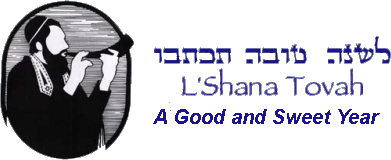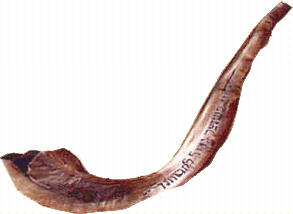
|
Roots Of Our Faith
The Fall Festivals Of Israel
Rosh HaShana
by haRold Smith
from Jerusalem, Israel
Then YHVH spoke to Moses, saying, "Speak to the children of Israel, saying: 'In the seventh month, on the first day of the month, you shall have a sabbath-rest, a memorial of blowing of trumpets, a holy convocation. You shall do no customary work on it; and you shall offer an offering made by fire to YaHoVeH.' " Leviticus 23:23-25
At sundown today begins the first of what is known in Israel as "The High Holy Days" or "Days of Awe" (they are also known as the "Days of Repentance", Amos 3:6). "Rosh HaShana" ushers in the beginning of these ten days of repentance leading up to "Yom Kippur," the Day of Atonement. Rosh HaShanah is at once solemn and joyful. It is solemn because of the Awe of judgment. It is joyful because it represents the hope of the future redemption of Israel. The more common Biblical name is "Feast of Trumpets" because of the accompanying blasting of the shofar - a ram's horn. Rosh HaShanah marks the day on which Adam, the first Hebrew, was created in which YHVH "breathed into his nostrils the breath of Life." (Genesis 2:7). It is through recreating this experience that we are able to relive it - it is this same breath which YHVH breathes into those who have received ruach hakodesh (Hebrew for spirit of the holy) that we employ to blow the shofar and thereby proclaim testimony to our creation and to the King Who created us!
The Hebrew word Rosh means 'head' or 'beginning', Ha means 'the' and Shanah means 'year', thus, it has come to be traditionally celebrated as the "Jewish New Year" in an appeasement to other world cultures; but scripture clearly gives the distinction of the beginning of the physical year to the same month that Pesach (Passover) is celebrated, The New Year begins on the 1st of Nisan (Leviticus 23:5) while Rosh HaShanah is celebrated on the 1st of Tishri (the seventh month - Leviticus 23:24). Scripturally, Rosh HaShanah has nothing in common with the beginning of a physical "new year" other than an optimistic new beginning in spirit that will prevail over the coming weeks and months.
There are several customs traditionally associated with Rosh Hashanah: the dipping of bread into honey after kiddush (the prayer over wine sanctifying the Sabbath or a holiday) and haMotzi (the blessing said before eating bread), as a symbol of the hope that the new year will be sweet; dipping pieces of apple into honey for the same reason (also, the apple is said to symbolize the Divine Presence); the use of round loaves of bread instead of the usual braided hallah (some say the round shape symbolizes a crown); avoidance of any kind of nuts (not a reference to your neighbor) because the numerical value of the Hebrew word for "nut" is the same as the word for "sin"; and the Tashlikh ceremony in which "sins" are ceremoniously tossed into a river and washed away, as penitential prayers are said.
 But far and away, the most obvious distinguishing feature of Rosh Hashanah is the blowing of the shofar, or ram's horn. The Biblical name for this holiday is, in fact, Zichron Teruah (remembrance of the shofar blast), or Yom Teruah (day of the shofar blast). In Biblical times the Shofar was blown to Hail the King, on this day it�s said that all Israel is believed to be before the King in anticipation of personal judgment.
But far and away, the most obvious distinguishing feature of Rosh Hashanah is the blowing of the shofar, or ram's horn. The Biblical name for this holiday is, in fact, Zichron Teruah (remembrance of the shofar blast), or Yom Teruah (day of the shofar blast). In Biblical times the Shofar was blown to Hail the King, on this day it�s said that all Israel is believed to be before the King in anticipation of personal judgment.
Unlike Pesach (Passover), the Bible does not clearly identify Rosh Hashanah with a historical event, so we must look to tradition to discover its significance. According to Talmudic (oral) tradition, the Ten Days of Awe, beginning at Rosh Hashanah, are the time in which YHVH determines the fate of each human being, a time of judgment. In the Synagogue the Shofar (trumpet) is blown daily to be sure that everyone knows that the time of Judgement is near. (Zephaniah. 1:14-16). On Rosh HaShanah, the wholly righteous are supposedly inscribed in the Sefer ha-Hayyim, or Book of Life, while the wholly wicked are inscribed in the Book of Death. The fate of all others hangs in the balance until Yom Kippur. Consequently, it is a time for introspection, for taking stock of one's behavior over the past year, making amends for any wrongdoing and restoring severed relationships - first with YHVH and then with men.
One very interesting ceremony of Rosh Hashanah is the custom of "Tashlich". This Hebrew word Tashlich means �you shall cast unto the sea�. In a Tashlich service, worshippers go to a body of water such as a stream or an ocean to toss the contents of their pockets into it while reciting passages such as Micah 7:19 as a symbol of sin being swallowed up in forgiveness and Psalm 103:11-12 to remind us of just how far YHVH has removed that forgiven sin from us.
This is not the only place in the Tanach (Old Testament) where God speaks of such total forgiveness for His people. Jeremiah 31:33-34 says: "For I will forgive their iniquities and remember their sins no more." Only one verse before, God declares that one day he will make a New Covenant (Brit Hadashah) with Israel, and put his Torah in their minds and write it on their hearts.
The Torah teaches that atonement requires the shedding of blood, i.e., a sacrifice (Leviticus 17:11-12). Yet, there is no more temple in which to make the sacrifice, so how can there be atonement? It is impossible to keep the Torah completely as long as there is no temple. The rabbis declared that prayers would take the place of the sacrifices, but is that really enough? If prayer is as good as sacrifice, why did YHVH ever demand sacrifice in the first place? Would HaShem allow the temple, so central to His service, to be taken away for so long without putting an alternative plan in place? If YHVH has allowed the temple to lie in ruins for so long, could it be that it is because he has provided another way?
 Suppose someone you know to be reliable gives you directions to someplace and you suddenly find yourself at a dead end. You know the directions are good, so you back up to see if you missed a turn somewhere. Those directions are the Torah and the prophets. The dead end is the Hurban (catastrophe). The missed turn is the fulfillment of the Covenant -- one that doesn't need a physical temple, because the ultimate sacrifice has already been made, making all other sacrifice obsolete. The Hebrew prophets predicted that a "Righteous Servant" would some day make such a sacrifice. Now, this is something to shout about, to sound a trumpet over - to Hail a King!
(Isaiah 53:6-12).
The Brit Hadashah (New Testament) also associates the sound of the shofar with the coming of Messiah
(1Thessalonians 4:16-17).
Suppose someone you know to be reliable gives you directions to someplace and you suddenly find yourself at a dead end. You know the directions are good, so you back up to see if you missed a turn somewhere. Those directions are the Torah and the prophets. The dead end is the Hurban (catastrophe). The missed turn is the fulfillment of the Covenant -- one that doesn't need a physical temple, because the ultimate sacrifice has already been made, making all other sacrifice obsolete. The Hebrew prophets predicted that a "Righteous Servant" would some day make such a sacrifice. Now, this is something to shout about, to sound a trumpet over - to Hail a King!
(Isaiah 53:6-12).
The Brit Hadashah (New Testament) also associates the sound of the shofar with the coming of Messiah
(1Thessalonians 4:16-17).
Yeshua is that Righteous Servant - what other candidates are there? His Atonement is the basis of the fulfillment of the Covenant spoken of by Jeremiah. If the New Testament is true ("Testament" is simply another word for Covenant or "Brit"), it proves that YHVH has not abandoned Am Yisrael (the people of Israel). Scripture shows that YHVH sent His Son to rescue His people from their sins as a prerequisite to the final restoration of Israel to the Land, when YaHoVeH Himself will rule over them as King. Marana Tha! (Aramaic for "Our Lord, Come!" - see the Need For Atonement).
| "For if you were cut out of the olive tree which is wild by nature, and were grafted contrary to nature into a cultivated olive tree, how much more will these, who are natural branches, be grafted into their own olive tree? For I do not desire, brethren, that you should be ignorant of this mystery, lest you should be wise in your own opinion, that blindness in part has happened to Israel until the fullness of the Gentiles has come in. And so all Israel will be saved, as it is written: "The Deliverer will come out of Zion, And He will turn away ungodliness from Jacob; For this is My covenant with them, When I take away their sins." Romans 11:24-27 |
Please feel free to email them to me at harold@hethathasanear.com. While not claiming to have all the answers, it would be an honor to share with you what the Spirit is uncovering.